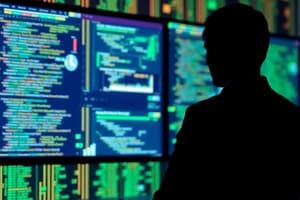Podcast
Questions and Answers
What is the right to have no public personal identity referred to as?
What is the right to have no public personal identity referred to as?
- Solitude
- Intimacy
- Reserve
- Anonymity (correct)
Which type of privacy involves the protection of unauthorized access to information itself?
Which type of privacy involves the protection of unauthorized access to information itself?
- Intimacy
- Institutional Privacy
- Informational Privacy (correct)
- Personal Privacy
Which right includes the prevention of anyone or anything that would intrude or violate personal space?
Which right includes the prevention of anyone or anything that would intrude or violate personal space?
- Intimacy
- Solitude (correct)
- Anonymity
- Reserve
What does the second category of privacy rights include?
What does the second category of privacy rights include?
What is the right not to be monitored referred to as?
What is the right not to be monitored referred to as?
Which type of privacy involves the privacy of personal attributes and the prevention of intrusion or violation of personal space?
Which type of privacy involves the privacy of personal attributes and the prevention of intrusion or violation of personal space?
What is one of the strands of information that needs to be protected?
What is one of the strands of information that needs to be protected?
Why is medical information considered very personal and important?
Why is medical information considered very personal and important?
What does identity theft involve?
What does identity theft involve?
What may be caused by hackers breaking into a database due to carelessness or failure to follow proper security procedures?
What may be caused by hackers breaking into a database due to carelessness or failure to follow proper security procedures?
Why is protecting personal identity becoming increasingly difficult?
Why is protecting personal identity becoming increasingly difficult?
Why do people usually establish relationships with those who respect their personal autonomy?
Why do people usually establish relationships with those who respect their personal autonomy?
Why is financial information important for organizations?
Why is financial information important for organizations?
What do individuals with less personal information have more of?
What do individuals with less personal information have more of?
What is a common approach used by identity thieves to capture personal data?
What is a common approach used by identity thieves to capture personal data?
What is the primary difference between ethics and morals?
What is the primary difference between ethics and morals?
What does accreditation assure in the context of a profession?
What does accreditation assure in the context of a profession?
What is the process by which candidates are evaluated to determine their readiness to enter a profession called?
What is the process by which candidates are evaluated to determine their readiness to enter a profession called?
What is the primary characteristic of a fully developed profession?
What is the primary characteristic of a fully developed profession?
Which of the following is a calling that requires specialized knowledge and often long and intensive academic preparation?
Which of the following is a calling that requires specialized knowledge and often long and intensive academic preparation?
How do ethical behavior and moral acts differ?
How do ethical behavior and moral acts differ?
What is the purpose of a professional code of ethics?
What is the purpose of a professional code of ethics?
Who is considered a computer/IT professional?
Who is considered a computer/IT professional?
What does professional development refer to?
What does professional development refer to?
What is the primary responsibility of data collectors with regard to privacy?
What is the primary responsibility of data collectors with regard to privacy?
What is the mechanism by which a profession ensures that its members use their knowledge and skills for the benefit of society?
What is the mechanism by which a profession ensures that its members use their knowledge and skills for the benefit of society?
What is the purpose of a professional society?
What is the purpose of a professional society?
What are the four primary issues regulated by computer ethics?
What are the four primary issues regulated by computer ethics?
What type of privacy involves protection from unauthorized access to information itself?
What type of privacy involves protection from unauthorized access to information itself?
What do various professions use to maintain and develop their knowledge and skills?
What do various professions use to maintain and develop their knowledge and skills?
What is the set of moral principles that regulate the use of computers known as?
What is the set of moral principles that regulate the use of computers known as?
Flashcards are hidden until you start studying
Study Notes
Privacy Rights
- The right to have no public personal identity is referred to as the right to anonymity.
- The right to protection of unauthorized access to information itself is referred to as informational privacy.
- The right to prevention of anyone or anything that would intrude or violate personal space is referred to as physical privacy.
Categories of Privacy Rights
- The second category of privacy rights includes the right to solitude, which involves the protection of personal attributes and the prevention of intrusion or violation of personal space.
Right to Non-Monitoring
- The right not to be monitored is referred to as the right to non-surveillance.
Information Protection
- One of the strands of information that needs to be protected is medical information, which is considered very personal and important.
- Identity theft involves the unauthorized use of someone's personal information.
Privacy Breaches
- Carelessness or failure to follow proper security procedures can lead to hackers breaking into a database, causing a breach of personal information.
- Protecting personal identity is becoming increasingly difficult due to the ease of accessing and sharing personal information.
Personal Autonomy
- People usually establish relationships with those who respect their personal autonomy.
- Financial information is important for organizations, and individuals with less personal information have more autonomy.
Identity Theft
- A common approach used by identity thieves to capture personal data is phishing.
Ethics and Morals
- The primary difference between ethics and morals is that ethics refers to the rules of conduct recognized by a particular group or profession, while morals refer to the principles of right and wrong.
- Accreditation assures that a professional has met the standards of a profession.
Professional Development
- The process by which candidates are evaluated to determine their readiness to enter a profession is called licensure.
- The primary characteristic of a fully developed profession is the need for specialized knowledge and long academic preparation.
- A professional code of ethics outlines the rules of conduct for a particular profession.
- A computer/IT professional is someone who has specialized knowledge and skills in the field of computer science.
- Professional development refers to the ongoing education and training of professionals.
Data Collectors
- The primary responsibility of data collectors with regard to privacy is to protect the personal information they collect.
Professional Societies
- The mechanism by which a profession ensures that its members use their knowledge and skills for the benefit of society is through professional societies.
- The purpose of a professional society is to establish and maintain standards for a profession.
Computer Ethics
- The four primary issues regulated by computer ethics are privacy, intellectual property, accountability, and accessibility.
- Various professions use continuing education to maintain and develop their knowledge and skills.
- The set of moral principles that regulate the use of computers is known as computer ethics.
Studying That Suits You
Use AI to generate personalized quizzes and flashcards to suit your learning preferences.




